
May 6, 2012
 CR Sunday Interview: Bernie Mireault
CR Sunday Interview: Bernie Mireault


*****
 Bernie Mireault
Bernie Mireault has been making comics for over a quarter-century now, his first professional comic debuting in I believe 1984. He is best known for his genial superhero series
The Jam. His latest, the self-published
To Get Her, offers up an extended meditation on the act of creating comics over a lifetime whose passage is otherwise marked by lengthy, complicated, personal relationships. Like most of Mireault's work, it features moments of exquisite comics craft execution and any number of idiosyncratic choices in how they're employed in the service of a narrative. Made for what was hoped might be a sustained period of interest from New York prose publishing houses in longer comics works,
To Get Her is now a limited edition of less than a thousand copies that Mireault hopes to sell in order to finance a second edition that might be distributed in more traditional fashion. I can't imagine there's anything much like it out there as a work of art or as a publishing project. -- Tom Spurgeon
*****
TOM SPURGEON: Tell me about the decision to work with so much prose. You even start To Get Her that way, with a lengthy prose section.
BERNIE MIREAULT: Over time I've decided that I'm no longer omniscient and so have no idea what other people are thinking and that it would be better not to pretend to. Thought balloons have become too silly-looking to me. Clouds! Good for a gag once maybe, but c'mon! Narration boxes usually do good work, but here I had more to say and so opted for the most concentrated form of communication available to print media: words. Also, I hadn't seen this particular blend of prose and imagery done before and thought that it was an obvious extension of graphic novel technique that I wanted to try.
The prose pages are my character's thoughts. There's a stream-of-consciousness chaos as to subject matter, switching between considering romantic relationships and the act of making comics. The theme of this story is how one can affect the other.
SPURGEON: I think utilizing prose that way is a valid choice, and there's no need for you to defend it or even explain it --
MIREAULT: Oops!
SPURGEON: [laughs] -- but I was interested in how you seized on that as an appropriate thing to do for this work and what you think it does in terms of the overall piece. Why that approach for this book?
MIREAULT: I've never had my work on
The Jam collected into a big book, and graphic novels [big books] were making inroads into the mainstream book publishing industry at the time [2003] and I wanted to make one too. I thought about what I felt constituted a "novel." A wide scope and lots of detail, I thought. A text element in my project would allow for a lot of detail. I knew that the typical mainstream comic buff would be put off by the prose portions but I figured they could just skip it and still get the main story. And if I could win them over into becoming more interested in the narrative, then there's all this information in the prose that explains motivations and character references. It was also fun to work with footnotes, appendices and an addendum.
SPURGEON: This book has something of a long, and maybe even tortured, provenance; it's something that's been in development for years and years now. Does working on a book like this -- a single, cohesive, piece of expression -- over that many years pose unique problems?
MIREAULT: Nothing unique, just the garden-variety problems of lower middle class existence in North America over that time period. Trying to do work I like to do, in and around many other little jobs that pay the rent, raising a family with two kids and dealing with a monetarily disappointed/depressed partner. It keeps you busy and I'm sure that many out there can relate. I got through it though, and this work is my memento of that time.
SPURGEON: Is it the same book when you're finishing it that you started, and would it be different if you had had the time to do the book in one, concerted shot?
MIREAULT: Because the work was done over a span of eight years, there was a lot of time to consider which way I wanted to go and I did as I wished, following my intuition. If I had done it in one concerted shot that would've meant I was doing it for a publisher [and getting paid] and I'd guess it wouldn't have been the same story at all because I'd have been looking to please them.
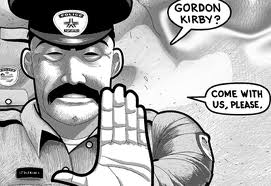 SPURGEON: Can I ask after the way you decided to publish this work? First, you've mentioned in a couple of places that you have representation, which makes me think that this book might have been intended for publication with a primarily prose publisher or one of the major boutique houses. Is that true? Were there places you thought this book would end up before you arrived at the present publishing package?
SPURGEON: Can I ask after the way you decided to publish this work? First, you've mentioned in a couple of places that you have representation, which makes me think that this book might have been intended for publication with a primarily prose publisher or one of the major boutique houses. Is that true? Were there places you thought this book would end up before you arrived at the present publishing package?
MIREAULT: I'm represented by
Kitchen, Lind and Assoc. LLC. I've always been a fan of
Denis Kitchen for his exquisite taste as a publisher, [
those Spirit magazines were huge for me, ditto the
Kurtzman stuff.] his cartooning and his congeniality. When I learned that he was representing artists professionally I applied because I couldn't imagine a more prestigious comic art representative, someone who is genuinely a part of the medium and its formation, and I was honored to be accepted. I may not be the most active component in their portfolio currently but I'm working on changing that.
When I began this project I had an idea that I would like to see if a mainstream book publisher, who were just getting more into comic art projects at the time, would be interested in it. To go over the heads of the powers that be in the North American mainstream comic book industry and see if the book publishing industry might not like to give it a whirl. Legend had it that they actually paid advances!
I joined KLA and they had a go at placing it but there was no interest. Years went by and I finished the work. Rather than wait for a publisher that might never materialize, I applied for a Xeric grant and getting that allowed me to keep going, to see the project through. It's been very satisfying and I look forward to continuing on as my own publisher.
SPURGEON: Second, I think the way you're publishing it is fairly interesting in and of itself -- it's basically a limited edition, with some attention paid to the quality of the package, with a hope that you'll be able to reach a readership directly. Is that a fair assessment? What led you to publishing this book that way, and since it's been out for a little while now, how has it gone? Is it reaching the audience you hoped for it?
MIREAULT: When I received
the Xeric grant, that was the inspiration to go ahead and self-publish. I imagined that this small first edition of 810 books would be used primarily to promote the existence of the book and generate some interest, eventually leading to a larger second edition available through regular channels. So far I've sold around 150 copies to various comic shops and given away about 60 review copies. I'm in no hurry to sell them and want to concentrate on promotion for now. 593 copies are left.
SPURGEON: Talk to me a bit about the Xeric Grant. How much do you think comics will miss that specific opportunity to self-publish on someone else's dime like that? You're using it in a very specific way, as a way to facilitate another printing down the road -- do you think maybe people got locked into specific ways of using that opportunity?
 MIREAULT:
MIREAULT: Oh boy! Things like the Xeric comic art self-publishing grant program stimulate so much and hopefully something will rise to replace it someday. When I was researching them I was amused to read how the formation of the foundation seemed to be basically
Peter Laird acting in self-defense. After the initial success of
Teenage Mutant Ninja Turtles, he was approached for money so frequently that he created the Xeric Foundation to deal with those requests in "an organized fashion." Of course I don't blame them for shutting it down citing the Internet as a free publishing platform. It's true. But still, there's something about entering a contest that's stimulating and I'm sure it gives people -- with few resources -- that extra nudge into trying to put something together. Like
the annual Eurovision song competition over in the EU. Hey, they broke
ABBA! Woo.
I think the Xerics gave a lot to North American comic art. I think that they're missed very much. The structure of a Xeric grant sort of locked you into using it in a very specific way. You don't get the funds directly, you have to pass invoices along by post. Printing, shipping and the creation of a web site are all allowable expenses and after paying for printing you could soak up any remaining grant funds through expense claims. Shipping is quite pricey these days and [the Xeric] easily covered it. The Xeric Foundation was great to deal with. Cheers to Kendall Clark, the Director. I thought that the structure of the grant made sense and rendered it fairly proof to abuse. I didn't get to buy any beer with it, it all went on actual expenses, so I figure that means that the system worked efficiently.
SPURGEON: Bernie, this is a book that is in a lot of ways about your life making comics. You've mentioned your education ruefully in a couple of places… do you ever feel let down by your formal education?
MIREAULT: No, I believe that school was just a form of babysitting anyway and almost gets in the way of real learning with simple survival taking up so much of the agenda. Few sitting in class have any intellectual interest in the proceedings. Most seemed to simply be using school as an excuse to stay out of the job market and were proud to be disruptive. And that's in college. Never liked the atmosphere. Always lots of bullshit.
I suppose school
does sort of force you to familiarize yourself with the status quo and to learn some social skills, what with being all together every day, and that's beneficial in the long run, [as long as everyone leaves their automatic weapons at home] but I was happy to be out of it. I guess I just had no luck with good schools or teachers, being a Canadian Airforce brat. Art just wasn't very high on anyone's list and comic art was beneath notice.
I believe that we learn best by doing. Years of experience say much more to me than a university degree.
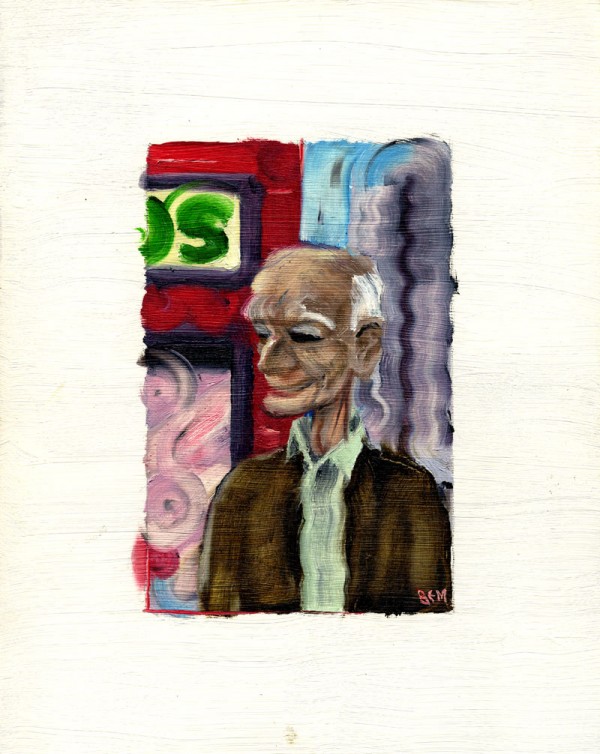 SPURGEON: Do you feel like you have the skill set necessary to make the kind of art you want? How much of doing a book like this one leads you to learning new skills, trying new approaches?
SPURGEON: Do you feel like you have the skill set necessary to make the kind of art you want? How much of doing a book like this one leads you to learning new skills, trying new approaches?
MIREAULT: Doing any work leads to refinements and changes in your over-all method as experience builds up and teaches forcibly in a way you can't ignore. The more work you do, the more thought is processed and distilled and the more streamlined your workflow. If an artist is actively engaged in what they're doing then they're
always looking for a chance to innovate, and your chances of success improve the more you work, ideally.
I'm quite happy with my skill set. While it certainly isn't perfect, it's allowed me to make a lot of comic art over the years, and to be able to enjoy the process while I do it. Because I've been allowed to come to my own conclusions about stuff without a "teacher" failing me for not agreeing with them, my work has a unique flavor and it really feels like a part of me.
 SPURGEON: You've mentioned in a couple of places about the moment in time you started to become extremely interested in comics, the fact that it was superhero-driven, genre-driven, even though you were cognizant of humor comics and even undergrounds. You've stated that this was exciting for you and your peers. What was the exact nature of that excitement, Bernie?
SPURGEON: You've mentioned in a couple of places about the moment in time you started to become extremely interested in comics, the fact that it was superhero-driven, genre-driven, even though you were cognizant of humor comics and even undergrounds. You've stated that this was exciting for you and your peers. What was the exact nature of that excitement, Bernie?
MIREAULT: That superhero comics were being mismanaged, consumers weren't being well-served and so the field was wide open for new things. My particular area of interest was to mix the symbols and conventions of superhero stuff with underground comics. That's what
The Jam came out of.
SPURGEON: Was it intrinsic to that genre? Was it that the focus on that genre left so much open for your potential contributions? What was exciting to you about doing comics at the cultural moment you began doing them?
MIREAULT: Yes, I think it was the would-be moral qualities of superhero comics that are what finally drew me in and compelled me to draw stories. Also, I always cheer for the underdog, and comic art fit that criteria well at the time.
What was [and still is] exciting is the act of personal expression and the possibility of entertaining others.
SPURGEON: I think it's interesting that your character the Jam works as personal expression, because on one level, of course it is, but on another I think what's appealing about that work is that we have very limited exposure to Gordie's mind-set and inner life -- that's different here. How do you feel about working in this very different mode of self-expression, for example bringing in this more interior monologue, but also showing how that character makes art?
MIREAULT: This has been an interesting experience in that as I’ve brought in more and more auto-bio detail, people have liked the protagonist less and less. Oh well. I guess I could’ve stuck with what it was that some people seemed to like about my work in the past, but that seemed lame. I think it's better to be yourself and have people not like it than to fake something for approval.
SPURGEON: For that matter, To Get Her
is a love letter in a lot of ways to continuing to do comics, and the struggle that entails. Is the nature of what you find compelling about doing comics much the same as it was 25 years ago, or is it different? How would you describe that continuing passion, and how might you contrast it to what you felt in those early days?
MIREAULT: I still feel the same as I did when I first started out. I'm experienced now, and so don't sweat the small stuff anymore, which is great. I've always managed to have fun with whatever I was working on at the time and never held back just because it didn't pay well or whatever. I can so easily get
into a thing, even when it's not my own thing, and have fun.
I feel like my inspiration is sound, even after all these years. One big change from then to now is that I used to dream of doing epics. Now I dream about short stories. I'm only human.
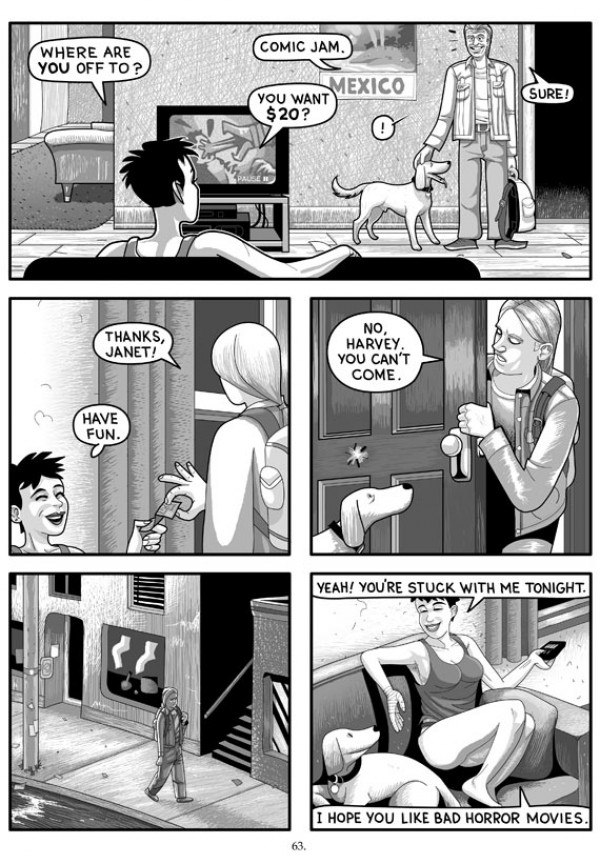 SPURGEON: I thought the tonal shifts in
SPURGEON: I thought the tonal shifts in To Get Her
were intriguing. If there's anything you're known for, it's the genial nature of a lot of your work, and here it seems like you're all over the place. Is that just the nature of this specific project, do you think, or is there some amount of ambiguity involved in doing autobiographically informed work, straight fiction, that's maybe not always there in some of your previous comics?
MIREAULT: To Get Her is fiction, but of course it's also partially based on various events I've gone through that I have a strong emotional record of and so use as grist for the mill. In past work, like
The Jam, I've always tried to be light and positive, which is how I like my entertainment. Even back then, though, Gordie and Janet's relationship was portrayed as contentious. [I've always been interested in romantic relationship dynamics, so mysteriously complex and difficult to negotiate.] With this project I've made that contention the focus of my story. Janet does not represent my ex. Gordie is not me. But I obviously do use real events as a springboard. I find it helps to move the work along, when you have a direct connection to it in that way.
SPURGEON: I want to ask about a couple of very specific narrative choices you make in making this work. I was going to say, "You include some comics work," but I think what's remarkable is that you include a lot
of comics work, page after page and from different projects. Why was it important for you to show that much work?
MIREAULT: It's all work I've done over the years that I liked and wanted people to see. I thought that presenting it through Gordie's hand is fun. Making him a cartoonist, I wanted to show that he worked hard at it and did more than one piece. Also, I've always liked the idea of stories nested into other stories. Anthology as nature intended.
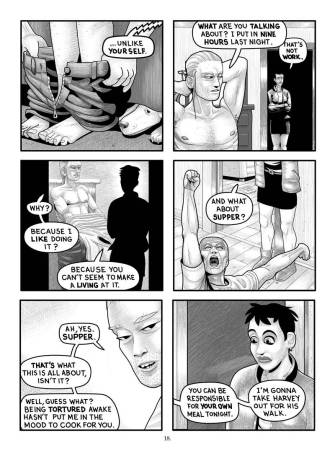 SPURGEON: What do you think that does to your narrative, the sense of timing that develops in a bigger book like this one?
SPURGEON: What do you think that does to your narrative, the sense of timing that develops in a bigger book like this one?
MIREAULT: Blows it out of the water? I don't know, it doesn't bother me but then I'm not the average reader. I guess everyone who reads it will have their own unique reaction to the diversions as they appear, perhaps skipping them entirely, as they probably did the prose portions earlier, maybe enjoying the tangent we go off on. Perhaps detours will be more interesting to a cartoonist than a layperson, but it was fun to do.
SPURGEON: Another thing I was hoping you'd answer for me is how you developed those little deadpan strips in the prose sections, with the author hanging over the reader and eventually going after this person. I thought those were really funny.
MIREAULT: I liked those too, the meta-strips. Though there are only 6 of them, they reside on our side of the fourth wall and represent another level of reality within the context of the book.
Provenance: I remember talking to my buddy, fellow cartoonist
Howard Chackowicz, about the work. He mentioned that he had shown it to his friend, author
Jonathan Goldstein, whose suggestion was that I include a real auto-bio layer into the narrative. I guess the idea took root and eventually came out in the form of those small
Bazooka Joe-type strips sprinkled throughout the prose bits.
SPURGEON: I thought the way you dealt with one of the book's major resolutions intriguing, that it takes place with a phone call rather than a direct confrontation. Was it intentional do you think for you to convey that moment in this kind of off-key way, rather than building it into this hugely dramatic moment? How worried were you that the book have a specific payoff in terms of the drama unfolding in its pages?
MIREAULT: Actually, when you think about it, most of this story takes place on the telephone. The image on the cover is a guy sitting beside a telephone framed inside the image of a diamond ring, [Telephone-ring, get it?] so the telephone is almost a character here in its own right.
I don't like to torture my characters. I just want everybody to be happy, do what they would like to do and to not lie to themselves about important emotional issues. I looked for the most humane way for things to proceed. It's fantasy, after all.
 SPURGEON: I tend to stay away from statements made through the work, but I wanted to ask a question about Janet. How serious should we take her point of view that Gordie approach things in a more mature fashion? Because she seems to harp on this a bit, but at the same time when he cuts his hair -- an overt sign of maturity -- she's taken aback, and when he asks her to return the ring -- which seems to me the adult thing to do -- she chalks the request up to his being a guy with a guy point of view.
SPURGEON: I tend to stay away from statements made through the work, but I wanted to ask a question about Janet. How serious should we take her point of view that Gordie approach things in a more mature fashion? Because she seems to harp on this a bit, but at the same time when he cuts his hair -- an overt sign of maturity -- she's taken aback, and when he asks her to return the ring -- which seems to me the adult thing to do -- she chalks the request up to his being a guy with a guy point of view.
MIREAULT: Janet is sort of an amalgamation of all the girlfriends that I've ever had. "Wildly self-indulgent" is putting it lightly. She does what she likes and says what she wants and if you were to ask her about a contradiction in her policy, you would be told in no uncertain terms to stop "living in the past." Working hard on comic art might force her to point out that you were "hiding from life." and a lack of funds always good for a sneer.
Janet was pretty hardened. There's a reason for that in her back-story, but now we'll just never know. She split.
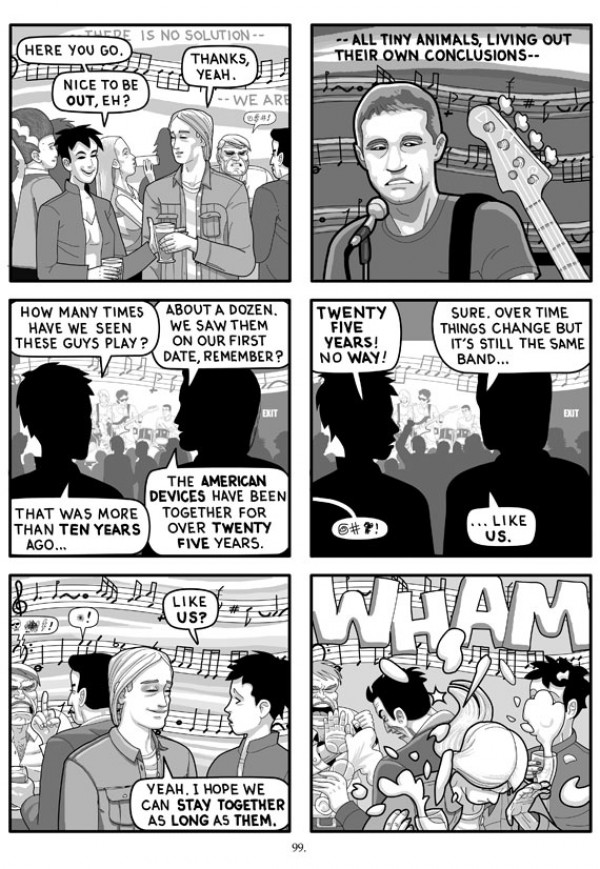 SPURGEON: How poignantly do you regard the passage of time? There's a certain elegance to the way you portray the longevity of the book's central relationship, including filtering that amount of time back through the length of a time a band has been together that a couple sees in concert. It made me wonder as to what you felt about some of the issues you present in the work, the emotional component involved.
SPURGEON: How poignantly do you regard the passage of time? There's a certain elegance to the way you portray the longevity of the book's central relationship, including filtering that amount of time back through the length of a time a band has been together that a couple sees in concert. It made me wonder as to what you felt about some of the issues you present in the work, the emotional component involved.
MIREAULT: I'm an emotional person and relationships are emotional projects, so they interest me very much. The older I get, the more sentimental, the stronger the interest. Relationships have had so much power over the quality of my life and yet effective management has so completely escaped me, despite my best efforts, that I've become dedicated to understanding this mystery better. Like some sort of
Don Quixote charging at that old windmill of a riddle; how can we get along better?
SPURGEON: Do you have a different perspective, then, for making this specific work of art? How much is making art part of that process of understanding for you, and how limited are the fruits of that understanding? Do you think you're better off in these areas for having art as an outlet, as a way of self-analysis?
MIREAULT: Whether you're making fictional comic art out of auto-bio stuff, or simply plugging-in to your creativity in any way, it taps into your internal dialogue and certainly has potentially positive therapeutic qualities. I definitely think that anybody who enjoys doing a thing benefits greatly from its practice and that the fruit of that labor should be precious to them. These things are like your children and you have to defend them. Others are quick to point out receding chins and buck-teeth, but then they don't try to do the work and so will never know anything of the joy of the intense connection between a parent and their fruit. How limited are the fruits of my understanding? I guess that's a subjective quantity and strictly relative to each reader's own personal experience, which would dictate your reaction to the work.
I figure that the math might look like this: [ToGetHer]Book + Human [w/ unique exp qty] = variable x 6,840,507,003.
*****
*
Bernie Mireault
*
To Get Her, Bernie Mireault, BEM Graphics, softcover, 176 pages, 2012, $25.
*****
* cover to
To Get Her
* image of "Gordie" at the drawing table
* stand-alone image from
To Get Her
* Xeric Foundation logo
* painting by Mireault
* classic image of The Jam
* four different moments from
To Get Her
* a lush and lovely Bernie Mireault illustration (below)
*****
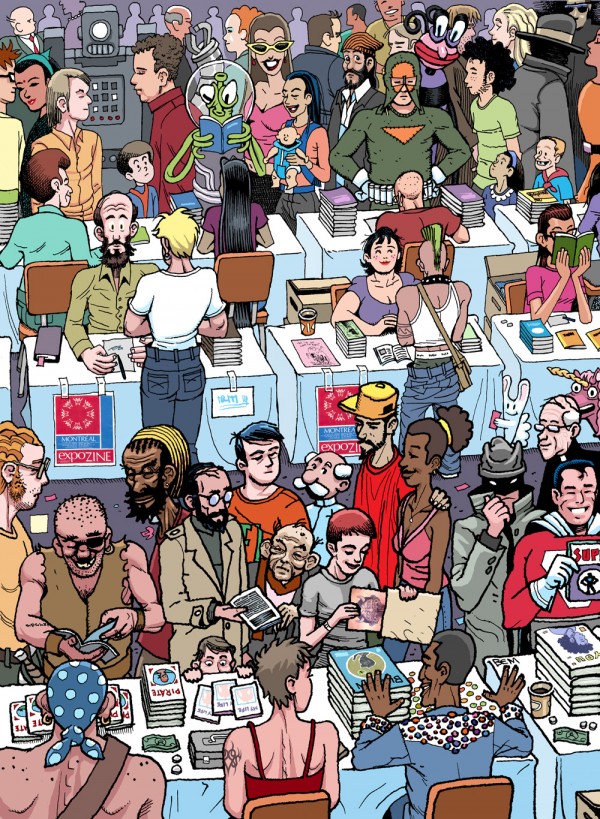
*****
*****
posted 6:00 am PST |
Permalink
Daily Blog Archives
November 2019
October 2019
September 2019
August 2019
July 2019
Full Archives


